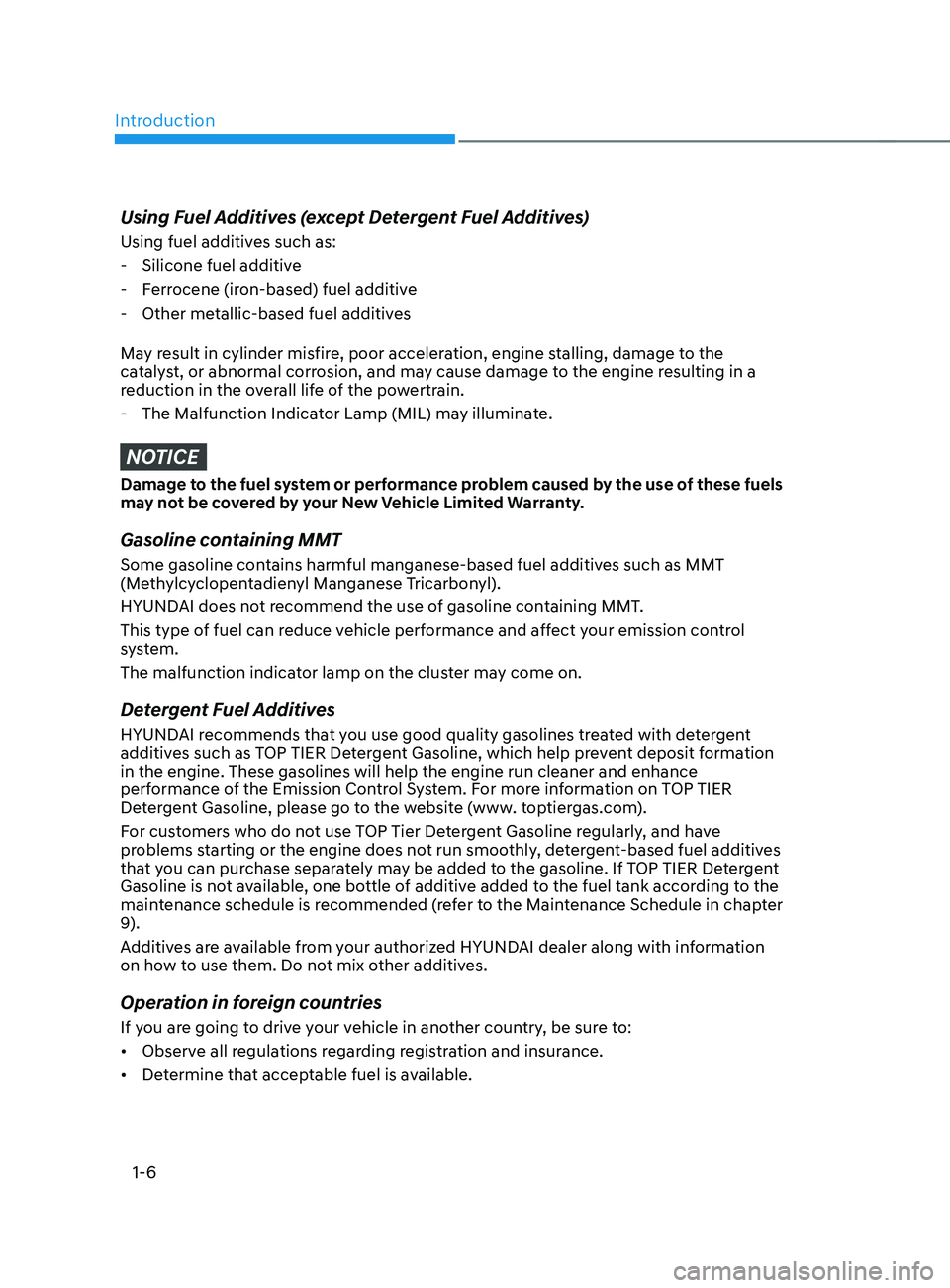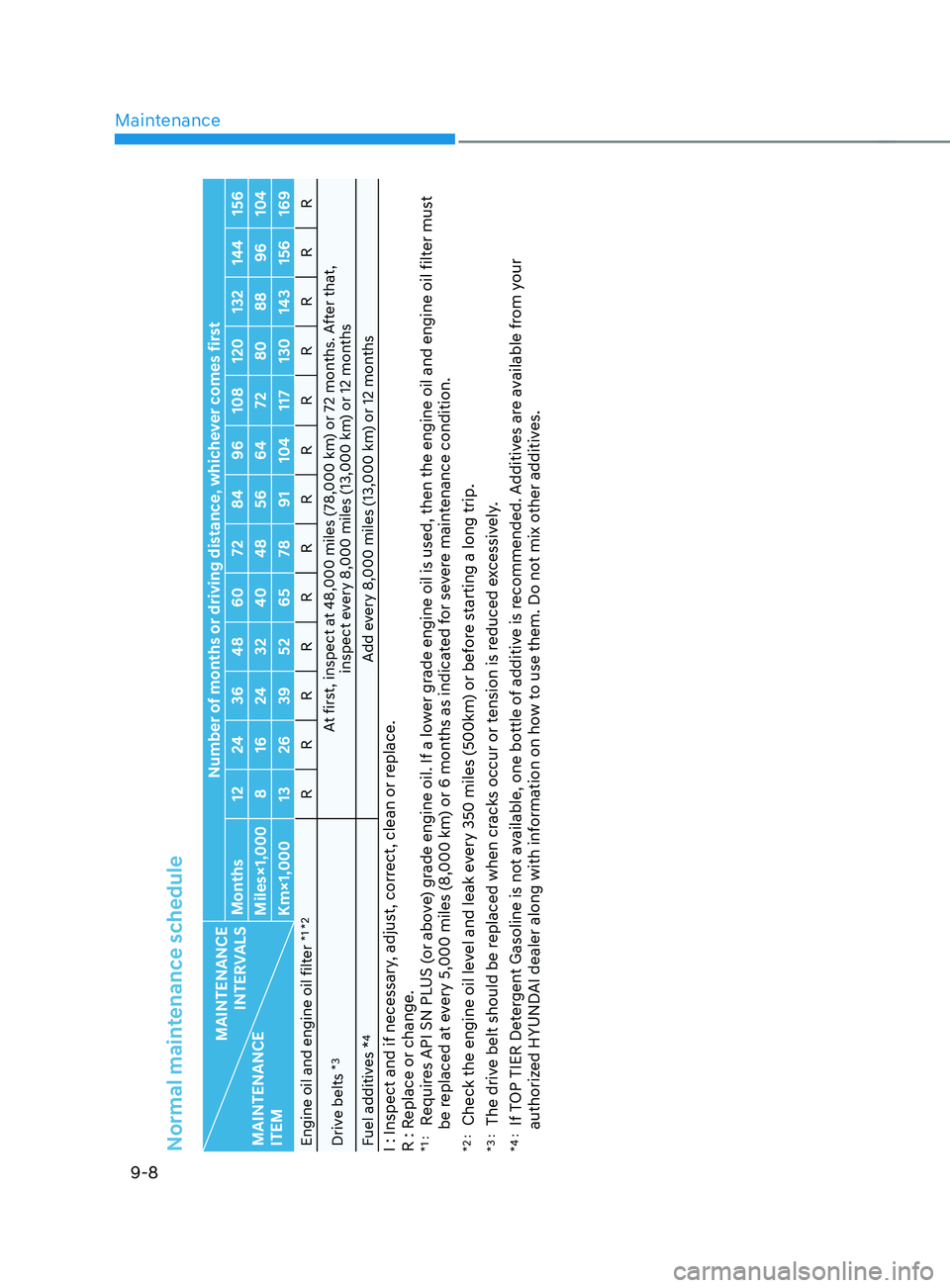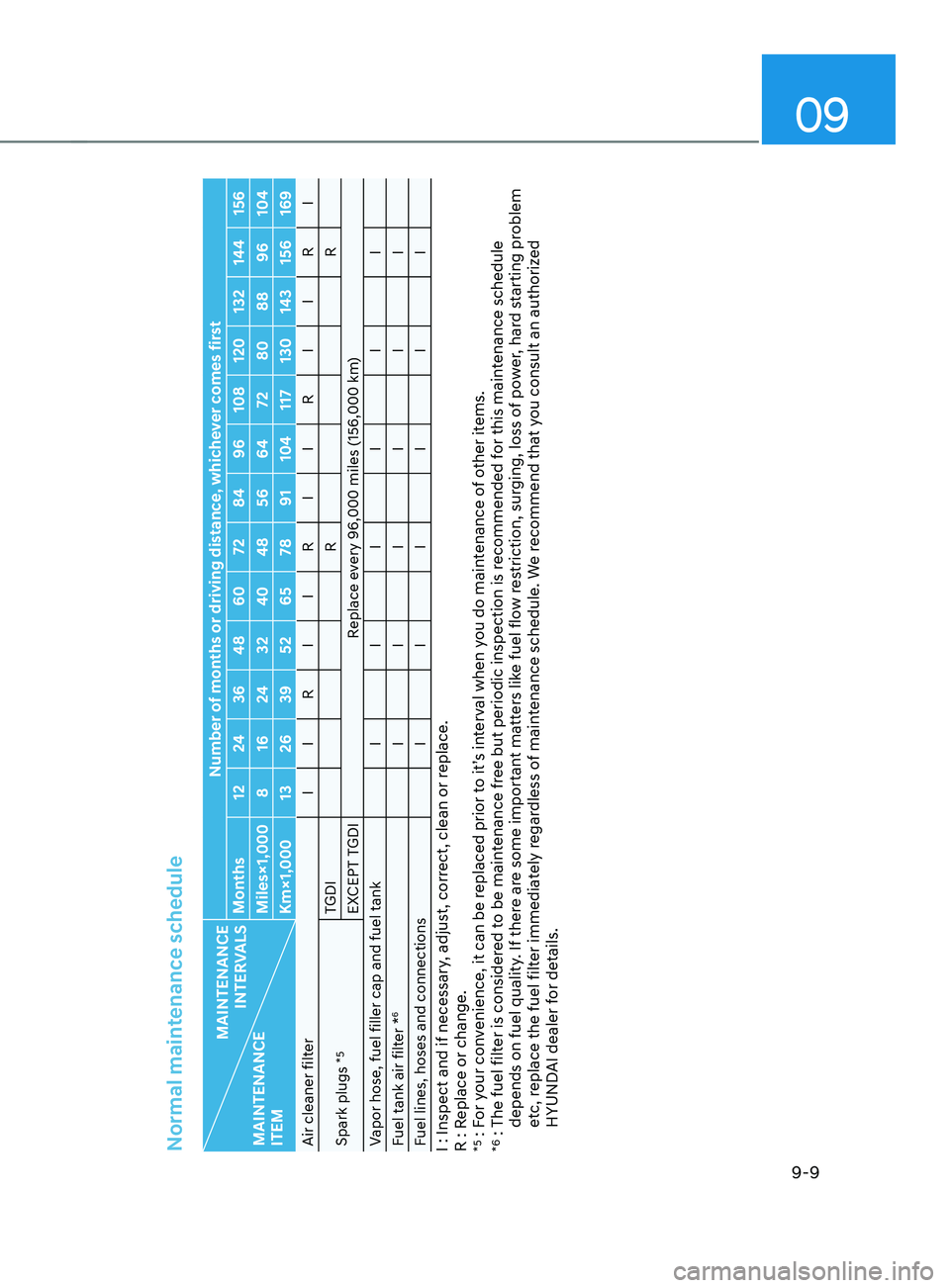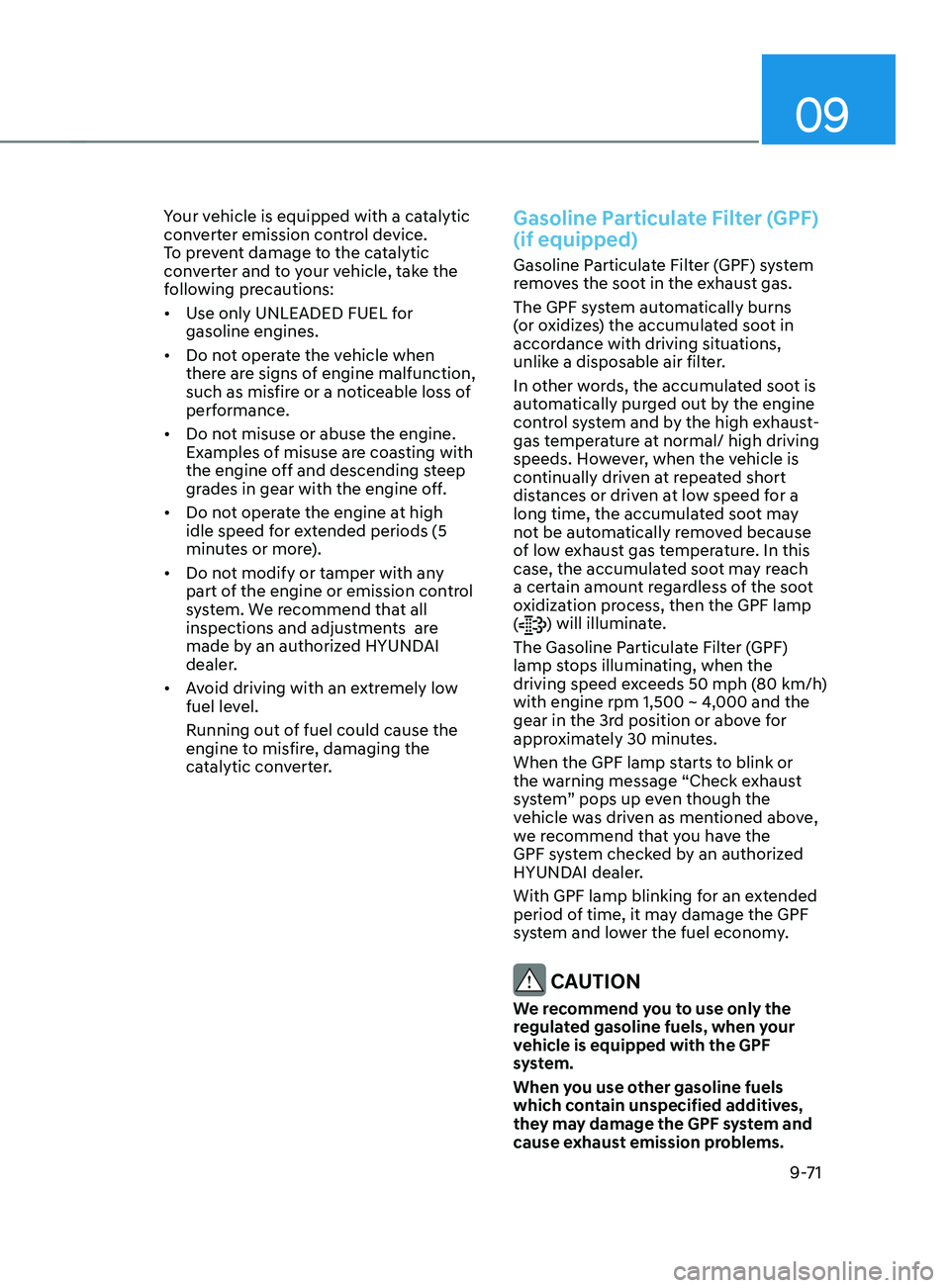2021 HYUNDAI SANTA FE fuel additives
[x] Cancel search: fuel additivesPage 12 of 636

Introduction
1-6
Using Fuel Additives (except Detergent Fuel Additives)
Using fuel additives such as:
- Silicone fuel additive
- Ferr
ocene (iron-based) fuel additive
- Other metallic
-based fuel additives
May result in cylinder misfire, poor acceleration, engine stalling, damage to the
catalyst, or abnormal corrosion, and may cause damage to the engine resulting in a
reduction in the overall life of the powertrain.
- The Malfunction Indicat
or Lamp (MIL) may illuminate.
NOTICE
Damage to the fuel system or performance problem caused by the use of these fuels
may not be covered by your New Vehicle Limited Warranty.
Gasoline containing MMT
Some gasoline contains harmful manganese-based fuel additives such as MMT
(Methylcyclopentadienyl Manganese Tricarbonyl).
HYUNDAI does not recommend the use of gasoline containing MMT.
This type of fuel can reduce vehicle performance and affect your emission control
system.
The malfunction indicator lamp on the cluster may come on.
Detergent Fuel Additives
HYUNDAI recommends that you use good quality gasolines treated with detergent
additives such as TOP TIER Detergent Gasoline, which help prevent deposit formation
in the engine. These gasolines will help the engine run cleaner and enhance
performance of the Emission Control System. For more information on TOP TIER
Detergent Gasoline, please go to the website (www. toptiergas.com).
For customers who do not use TOP Tier Detergent Gasoline regularly, and have
problems starting or the engine does not run smoothly, detergent-based fuel additives
that you can purchase separately may be added to the gasoline. If TOP TIER Detergent
Gasoline is not available, one bottle of additive added to the fuel tank according to the
maintenance schedule is recommended (refer to the Maintenance Schedule in chapter
9).
Additives are available from your authorized HYUNDAI dealer along with information
on how to use them. Do not mix other additives.
Operation in foreign countries
If you are going to drive your vehicle in another country, be sure to:
• Observe all regulations regarding registration and insurance.
• Determine that acceptable fuel is available.
Page 558 of 636

Maintenance
9-8
Normal maintenance schedule
MAINTENANCE INTERVALS
MAINTENANCE
ITEM Number of months or driving distance, whichever comes first
Months 12 24 36 48 60 72 84 96 108 120 132 144 156
Miles×1,000 8 16 24 32 40 48 56 64 72 80 88 96 104
Km×1,000 13 26 39 52 65 78 91 104 117 130 143 156 169
Engine oil and engine oil filter
*1 *2
R R R R R R R R R R R R R
Drive belts
*3
At first, inspect at 48,000 miles (78,000 km) or 72 months. After that, inspect every 8,000 miles (13,000 km) or 12 months
Fuel additives *
4
Add every 8,000 miles (13,000 km) or 12 months
I : Inspect and if necessary, adjust, correct, clean or replace.
R : Replace or change.*1 : Requires API SN PLUS (or above) grade engine oil. If a lower grade engine oil is used, then the engine oil and engine oil filter must
be replaced at every 5,000 miles (8,000 km) or 6 months as indicated for severe maintenance condition.
*2 : Check the engine oil level and leak every 350 miles (500km) or before starting a long trip.
*3 : The drive belt should be replaced when cracks occur or tension is reduced excessively.
*4 : If TOP TIER Detergent Gasoline is not available, one bottle of additive is recommended. Additives are available from your
authorized HYUNDAI dealer along with information on how to use them. Do not mix other additives.
Page 559 of 636

09
9-9
Normal maintenance schedule
MAINTENANCE INTERVALS
MAINTENANCE
ITEM Number of months or driving distance, whichever comes first
Months 12 24 36 48 60 72 84 96 108 120 132 144 156
Miles×1,000 8 16 24 32 40 48 56 64 72 80 88 96 104
Km×1,000 13 26 39 52 65 78 91 104 117 130 143 156 169
Engine oil and engine oil filter
*1 *2
R R R R R R R R R R R R R
Drive belts
*3
At first, inspect at 48,000 miles (78,000 km) or 72 months. After that, inspect every 8,000 miles (13,000 km) or 12 months
Fuel additives *
4
Add every 8,000 miles (13,000 km) or 12 months
I : Inspect and if necessary, adjust, correct, clean or replace.
R : Replace or change.*1 :
Requires API SN PLUS (or above) grade engine oil. If a lower grade engine oil is used, then the engine oil and engine oil filter must
be replaced at every 5,000 miles (8,000 km) or 6 months as indicated for severe maintenance condition.
*2 :
Check the engine oil level and leak every 350 miles (500km) or before starting a long trip.
*3 :
The drive belt should be replaced when cracks occur or tension is reduced excessively.
*4 :
If TOP TIER Detergent Gasoline is not available, one bottle of additive is recommended. Additives are available from your
authorized HYUNDAI dealer along with information on how to use them. Do not mix other additives.
Normal maintenance schedule
MAINTENANCE INTERVALS
MAINTENANCE
ITEM Number of months or driving distance, whichever comes first
Months 12 24 36 48 60 72 84 96 108 120 132 144 156
Miles×1,000 8 16 24 32 40 48 56 64 72 80 88 96 104
Km×1,000 13 26 39 52 65 78 91 104 117 130 143 156 169
Air cleaner filter I I R I I R I I R I I R I
Spark plugs
*5
TGDI RR
EXCEPT TGDI Replace every 96,000 miles (156,000 km)
Vapor hose, fuel filler cap and fuel tank IIIIII
Fuel tank air filter *
6
I IIIII
Fuel lines, hoses and connections IIIIII
I : Inspect and if necessary, adjust, correct, clean or replace.
R : Replace or change.*5 : For your convenience, it can be replaced prior to it’s interval when you do maintenance of other items. *6 : The fuel filter is consider ed to be maintenance free but periodic inspection is recommended for this maintenance schedule
depends on fuel quality. If there are some important matters like fuel flow restriction, surging, loss of power, hard starting problem
etc, replace the fuel filter immediately regardless of maintenance schedule. We recommend that you consult an authorized
HYUNDAI dealer for details.
Page 621 of 636

09
9-71
Your vehicle is equipped with a catalytic
converter emission control device.
To prevent damage to the catalytic
converter and to your vehicle, take the
following precautions:
• Use only UNLEADED FUEL for
gasoline engines.
• Do not operate the vehicle when
there are signs of engine malfunction,
such as misfire or a noticeable loss of
performance.
• Do not misuse or abuse the engine.
Examples of misuse are coasting with
the engine off and descending steep
grades in gear with the engine off.
• Do not operate the engine at high
idle speed for extended periods (5
minutes or more).
• Do not modify or tamper with any
part of the engine or emission control
system. We recommend that all
inspections and adjustments are
made by an authorized HYUNDAI
dealer.
• Avoid driving with an extremely low
fuel level.
Running out of fuel could cause the
engine to misfire, damaging the
catalytic converter.Gasoline Particulate Filter (GPF)
(if equipped)
Gasoline Particulate Filter (GPF) system
removes the soot in the exhaust gas.
The GPF system automatically burns
(or oxidizes) the accumulated soot in
accordance with driving situations,
unlike a disposable air filter.
In other words, the accumulated soot is
automatically purged out by the engine
control system and by the high exhaust-
gas temperature at normal/ high driving
speeds. However, when the vehicle is
continually driven at repeated short
distances or driven at low speed for a
long time, the accumulated soot may
not be automatically removed because
of low exhaust gas temperature. In this
case, the accumulated soot may reach
a certain amount regardless of the soot
oxidization process, then the GPF lamp
(
) will illuminate.
The Gasoline Particulate Filter (GPF)
lamp stops illuminating, when the
driving speed exceeds 50 mph (80 km/h)
with engine rpm 1,500 ~ 4,000 and the
gear in the 3rd position or above for
approximately 30 minutes.
When the GPF lamp starts to blink or
the warning message “Check exhaust
system” pops up even though the
vehicle was driven as mentioned above,
we recommend that you have the
GPF system checked by an authorized
HYUNDAI dealer.
With GPF lamp blinking for an extended
period of time, it may damage the GPF
system and lower the fuel economy.
CAUTION
We recommend you to use only the
regulated gasoline fuels, when your
vehicle is equipped with the GPF
system.
When you use other gasoline fuels
which contain unspecified additives,
they may damage the GPF system and
cause exhaust emission problems.